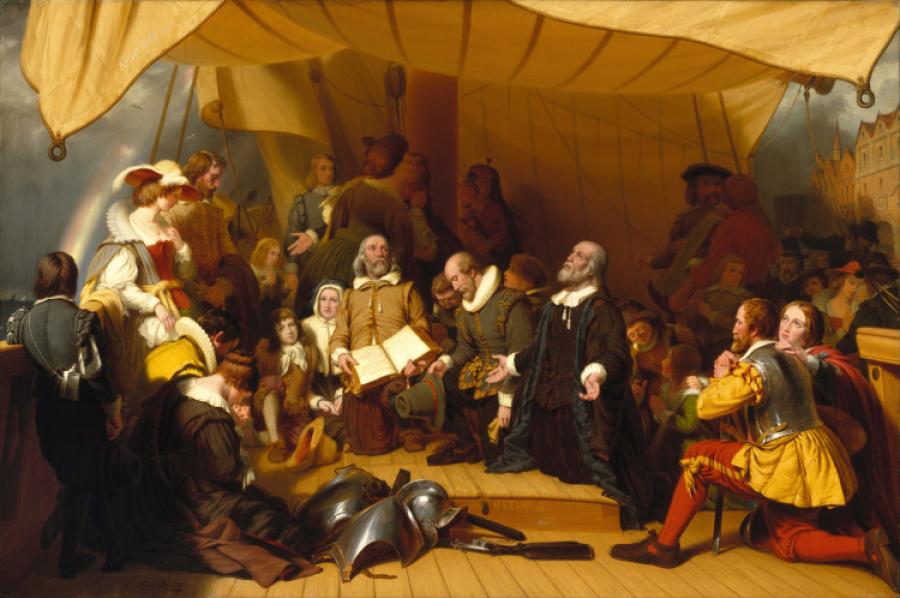Making Thanksgiving Real (Part 2)
Image

Embarkation of the Pilgrims - Robert Walter Weir (1857)
Read Part 1.
In our quest to make Thanksgiving real, we left off by thinking about ways to ground our Thanksgiving in Scripture, following the example of the very Pilgrims who left this treasure as a heritage to our entire nation. The next challenge I would offer is to ground our Thanksgiving in history—primarily the history of these same Pilgrims.
Our American Thanksgiving dates back to the fall of 1621. Indeed, it represents a Christian ideal—a very Biblical ideal. Yet, it is also a remembrance of God’s providential working at the dawn of our country.
Recently, after I spoke to a church group about the Pilgrims, the pastor stood up and shared from his heart how much he believes this message to be desperately needed today, especially by our young people—and yet how little is known of it. He said that telling the Pilgrims’ story to many of our youth would be like speaking to them in a foreign language.
The account of the Pilgrims and the first Thanksgiving is so incredible that if one were hearing it for the first time, he might believe it to be a fiction novel—a work of fantasy.
Do you know the history of the Pilgrims? Have you taught it to your family? This would be a wonderful time to read a book or article, or watch a video, on the Pilgrims. You might even consider making a little knowledge of the Pilgrims mandatory for anyone who wants to partake of the turkey at your bountiful Thanksgiving table!
If we truly want to make Thanksgiving real, let’s get serious about the amazing riches bequeathed to us—at great cost to our Pilgrim Fathers, yet purely by God’s grace.
We also certainly need to ground our Thanksgiving in faith. I grew up in a tradition that still offered church services on Thanksgiving morning and, quite frankly, that made a very deep impression upon me in my childhood. Perhaps that is a custom to which few can relate. Today, in fact, the trend seems to be toward canceling services on the presumption that people will be traveling, or otherwise too busy to attend.
I don’t mean to be a stickler on the calendar, but I would say that churches should certainly pick a time when they emphasize Thanksgiving—hopefully to such an extent that it will move the hearts of everyone seeking something real.
If your church isn’t doing much to make your Thanksgiving real, there are still many resources to help you—and that leads us into our next point. Since the days of the Pilgrims, Thanksgiving has always been a family event—even as the feast of tabernacles was, for thousands of years before that (see Deut. 16:14). In fact, when most of us think about Thanksgiving, our first thought is probably one of a family gathering, perhaps even in our past, or from our childhood experiences.
How glorious it is when those family events are also faith-filled. Again, what a wonderful time this is to share from the Scriptures, or to discuss the history of the Pilgrims. Maybe you can only give out a small dosage at the dinner table, but perhaps you could offer an opportunity for those who want to know more to discuss these things in greater detail.
Like the Pilgrims, we must pray, sing and give thanks to God—and soon Thanksgiving will start to become real again. Make Thanksgiving different than any other Thursday of the year, and make lasting memories.
I will offer to You the sacrifice of thanksgiving,
And will call upon the name of the Lord. (Ps. 116:17)1Therefore by Him let us continually offer the sacrifice of praise to God, that is, the fruit of our lips, giving thanks to His name. (Heb. 13:15)
Finally, I would encourage you to ground your Thanksgiving in hope. Henry Alford’s classic Thanksgiving hymn, written in 1844, sets Thanksgiving in a unique light—comparing it to the great harvest at the end of history:
Even so, Lord, quickly come,
bring thy final harvest home;
gather thou thy people in,
free from sorrow, free from sin.2
Thanksgiving provides an opportunity to return the year now ending back to God—giving Him our praise, and letting Him bear our fears, disappointments and regrets.
But, as Alford’s great hymn illustrates, Thanksgiving also leaves us focusing on the future—our eternal future in Christ, and our temporal future here on Earth. It strengthens and encourages us for the new year ahead, the next phase in God’s plan for our service to Him, if we will only allow it to do so.
Yes, Thanksgiving is vitally important. It’s my favorite holiday. And, I hope and trust that it will become incredibly real in your life this year.
Happy Thanksgiving!
Notes
1 Scripture taken from the New King James Version®. Copyright © 1982 by Thomas Nelson. Used by permission. All rights reserved.
2 Henry Alford; “Come, Ye Thankful People, Come.” Public domain. Taken from “Come, ye thankful people, come;” Hymnary.org; n.d.; https://hymnary.org/text/come_ye_thankful_people_come, Internet; accessed 23 November 2022.
Paul Scharf 2019 Bio
Paul J. Scharf (M.A., M.Div., Faith Baptist Theological Seminary) is a church ministries representative for The Friends of Israel Gospel Ministry, serving in the midwest. He also assists Whitcomb Ministries and writes for “Answers” Magazine and Regular Baptist Press. For more information on his ministry, visit foi.org/scharf or email [email protected].
- 16 views


Discussion